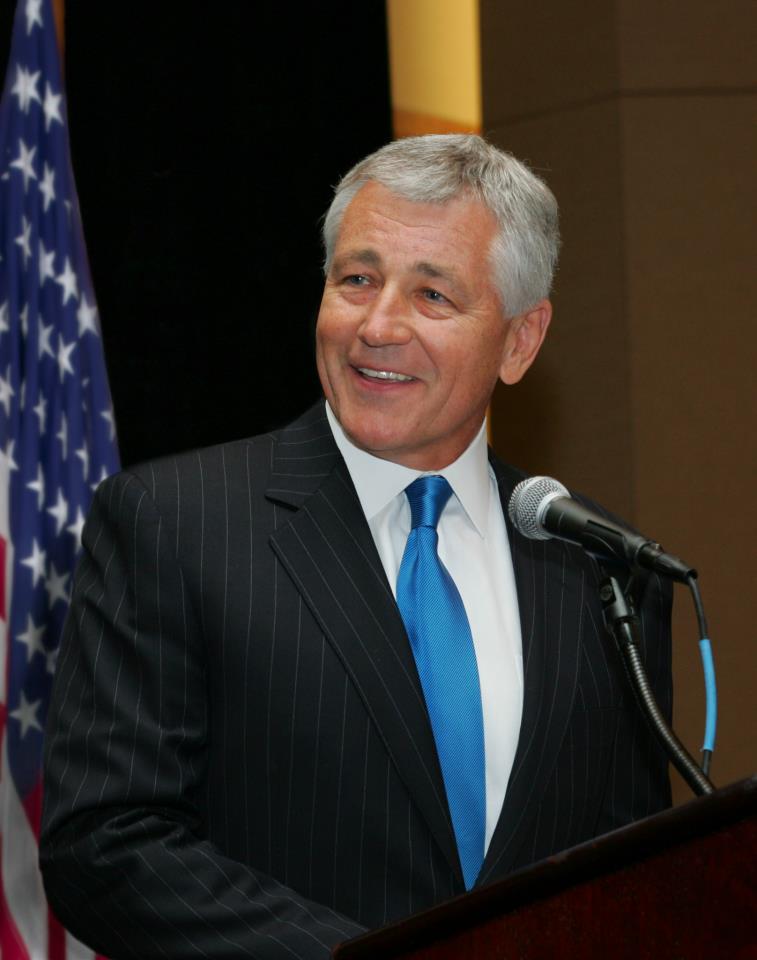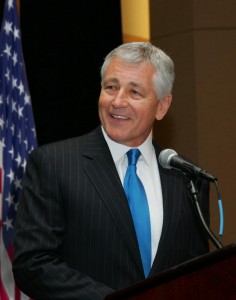
ASP Board Member Chuck Hagel’s Positions on Climate Change
 There has been discussion about Senator Hagel’s position on climate change, most related to the Byrd-Hagel resolution of 1997, a resolution adopted by the Senate by a vote of 95-0. The following outlines five key actions taken by Sen. Hagel while in office to address climate change.
There has been discussion about Senator Hagel’s position on climate change, most related to the Byrd-Hagel resolution of 1997, a resolution adopted by the Senate by a vote of 95-0. The following outlines five key actions taken by Sen. Hagel while in office to address climate change.
Senator Hagel contributed to ASP’s Climate Security Report, saying:
“America and the world face unprecedented, complex and interconnected 21st Century challenges. Environmental issues will continue to have unpredictable and destabilizing effects on developing and developed countries alike.”
Below are his positions in detail:
1. Senator Hagel Believes Climate Change is a Threat to U.S. National Security
For a Secretary of Defense, this is the most important point. Hagel was an original cosponsor of S.1018 in the 110th Congress, which required the Director of National intelligence to submit to Congress a National Intelligence Estimate on the anticipated geopolitical effects of global climate change and the implications of such effects on the national security. This legislation found that “The consequences of global climate change represent a clear and present danger to the security and economy of the United States.” The legislation was included as an amendment to the Committee-passed FY08 Intelligence Authorization, but was removed before passage on the Senate floor due to opposition in the Senate. However, this legislation spurred the intelligence community to initiate a National Intelligence Assessment on climate change, completed in the summer of 2008.
- The full text of S.1018 is available here.
- The testimony of Thomas Fingar, Deputy Director of National Intelligence, to Congress on the NIA that resulted from this legislation is available here.
2. Senator Hagel was the author of compromise climate legislation in 2005
Hagel’s amendments to the 2005 Energy Policy Act (H.R.6) were included as Title XVI and XVII. Title XVI, which provides for a national policy for development and deployment of clean technology, is the only legislation on reducing greenhouse gas emissions that that has become law in the U.S. It was a bipartisan compromise legislation that ensured that climate change was addressed in the ’05 Energy Policy Act. Included in Title XVII, “Incentives for Innovative Technologies” was authorization for the Department of Energy’s loan guarantee program foe clean technology. This is what the Obama Administration used in the 2009 stimulus bill to fund and support many new and developing clean technologies.
3. Senator Hagel Supported Efforts to Share Clean Technology with Developing Nations
Senator Hagel believed that the best way to address climate change was by developing new technology and helping to deploy it around the world. He was an original cosponsor of the “International Clean Development Technology Fund Act” (S.3273) in 2008 along with Senators Biden, Lugar, and Menendez. This legislation would have allowed the U.S. to directly support the deployment of technology abroad. Although it did not pass, it was model for the “Green Climate Fund” eventually created by international agreement in the 2010 UNFCCC Conference of the Parties in Cancun.
4. The 1997 Byrd-Hagel Resolution was meant to encourage the Clinton Administration to take a more productive negotiating tactics.
The Byrd-Hagel Resolution was passed before the final negotiations for the Kyoto Protocol because it was understood by Senate observers that the negotiations, as they were then going, were detrimental to the U.S. It passed by a vote of 95-0 The resolution found that “the exemption for Developing Country Parties is inconsistent with the need for global action on climate change and is environmentally flawed” because it exempted developing countries from emissions reductions. This criticism has been borne-out by subsequent events: even had the U.S. signed the Kyoto Protocol and met all its commitments, global emissions would still have risen as rapidly, because large countries (particularly China) have not been bound by an emissions restrictions. The problem was the principle of “Common but differentiated responsibilities” enshrined in the UNFCCC, which had been agreed in Berlin in 1995. In practice, it meant that much was asked from the U.S., while nothing was asked from the rest.
5. Although Senator Hagel Opposed Kyoto Ratification, he told the Bush Administration that they had to offer something else
Hagel said to the Bush Administration about Kyoto: “I don’t think you can walk away from this,” because “you have an entire international community that’s upset with us; an entire international community that believes that we use most of the Earth’s resources and we squander them.” Senator Hagel would have instead offered to develop technology and negotiate with allies around the world to come to a way to measurably, reportably, and verifiably reduce emissions without harming the economy.
- For Hagel’s discussion on this, see here.






… [Trackback]…
[…] Read More Infos here: americansecurityproject.org/blog/2012/asp-board-member-chuck-hagels-positions-on-climate-change/ […]…
[…] In 2005, Hagel declared climate change to be one of his top priorities and introduced a trio of climate-related bills. One had an international focus, calling for the U.S. to help developing countries adopt technologies that would reduce greenhouse-gas intensity. “This bill directs the secretary of state to engage global climate change as a foreign policy issue,” Hagel explained in a speech at the Brookings Institution [PDF]. The two others were aimed at spurring domestic cleantech development by authorizing billions in government-sponsored loans, incentives, and tax credits for businesses. The bills were passed as amendments to the 2005 Energy Policy Act. […]
[…] In 2005, Hagel declared climate change to be one of his top priorities and introduced a trio of climate-related bills. One had an international focus, calling for the U.S. to help developing countries adopt technologies that would reduce greenhouse-gas intensity. “This bill directs the secretary of state to engage global climate change as a foreign policy issue,” Hagel explained in a speech at the Brookings Institution [PDF]. The two others were aimed at spurring domestic cleantech development by authorizing billions in government-sponsored loans, incentives, and tax credits for businesses. The bills were passed as amendments to the 2005 Energy Policy Act. […]
[…] state Senator Harry Byrd to keep the U.S. from ratifying the Kyoto treaty, although he now claims he did this because he wanted to see a stronger treaty–and it’s true, the Kyoto […]
[…] of Defense, Chuck Hagel (March, […]
[…] of Defense, Chuck Hagel (March, […]